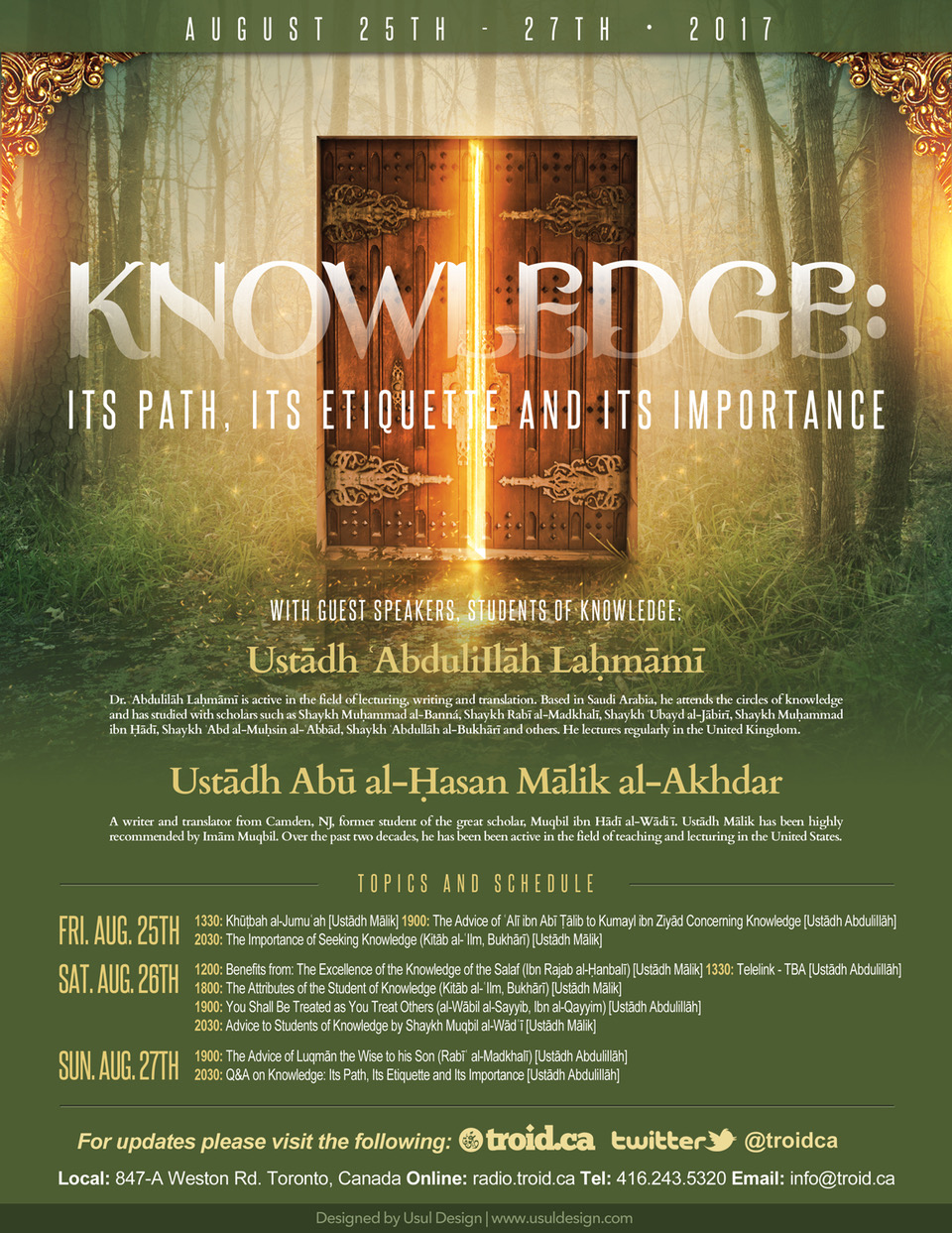- What is knowledge? Shaykh Ṣalaḥ al-ʿUthaymīn says: Linguistically it is the opposite of ignorance, and it is to firmly comprehend a matter upon its reality. Its definition as it relates to Istilāḥ in the Sharīʿah refers to the knowledge revealed by Allāh to the Messenger (ṣallallāhu ʿalayhi wa-sallam), i.e the two revelations, the Qurʾān, and the Sunnah, which also came by way of revelation. And that which is considered as knowledge which is praiseworthy is the knowledge of revelation.
- The Prophet (ṣallallāhu ʿalayhi wa-sallam) said ‘Whomsoever Allāh wants good for, He gives him understanding of the religion’. Shaykh Muqbil (raḥimahullāh) said: The opposite can also be said to be the truth, that whomsoever Allāh does not want good for is not given knowledge.
- Our respected elder, discusses a number of benefits extracted from Ṣaḥīḥ al-Bukhārī, Kitāb al-ʿilm, Chapter: Knowledge Preceds Statement and Action.
- Knowledge before statement and action is a firmly established principle in the dīn of Allāh and we see the scholars reiterate it over and over again using evidences from the Book of Allālh and the Sunnah of the Messenger (ṣallallāhu ʿalayhi wa-sallam).
- The statement Imām al-Bukhāri is a benefit extract from the statement of Allāh:
فَٱعۡلَمۡ أَنَّهُ ۥ لَآ إِلَـٰهَ إِلَّا ٱللَّهُ وَٱسۡتَغۡفِرۡ لِذَنۢبِكَ
So know (O Muḥammad) that Lā ilāha illā-allāh (none has the right to be worshipped but Allāh) and ask forgiveness.
[Sūrah Muḥammad, 47: 19]
- Allāh began with knowledge first, and then ordered that after the attainment of this knowledge the seeking of forgiveness comes.
- Istighfār here is the point of the action and the statement, so knowledge comes first before seeking forgiveness, and this is because one must must have knowledge of their Lord.
- The fiqh of the scholars of ḥadīth can be found in the chapter headings of their books, if one wants to find their understanding regarding a hadith then they need not look than their chapter headings.
- Knowledge precedes statement and actions, and the statement itself is an action of the tongue, so therefore it is a branch of this affair of ʿilm.
- Nobody does an action with the intention of growing closer to Allāh except that it is first established with evidence.
- Allāh has either made an affair obligatory or desired, both fall into the category of the sunnah.
- Ibn Taymīyyah (raḥimahullāh) brings in the muqaddimah of Uṣūl al-Tafsīr the narration: we did not go beyond ten āyah in memorising the Qurʾān until we understood them and then acted upon them and taught them to others, we were given knowledge and action.
- Shaykh ʿAbd al-Muḥsin al-ʿAbbād was asked concerning the narration: ‘O Rasūl Allāh, inform me of something regarding the religion of Islam I cannot ask anyone besides you.’ The questioner asked regarding this narration: ‘Is this ḥadīth an evidence that one should seek knowledge first before acting?’ The shaykh answered (and this can be found in his explanation of Imām al-Nawawī’s 40 Ḥadīth): ‘There is no doubt that knowledge precedes action and statement, as Imām al-Bukhārī has written in his chapter heading: Knowledge Precedes Statement and Action. A person’s actions must be based upon knowledge, Allāh mentions in Sūrah al-ʿAsr ‘Those who believe and do righteous actions’, i.e. having firm belief upon knowledge (ʿilm) and not jahl (ignorance). First comes belief then actions. And what do they do after working righteous deeds? They advise one another in truth and patience, spreading benefit to others.
- Based upon this ḥadīth above, why would a person ask if this was an evidence one should seek knowledge before action? It is because he wanted to gain knowledge from the Prophet (ṣallallāhu ʿalayhi wa-sallam) before implementing it, so the question came first.
- Shaykh Muḥammad ibn ʿAbd al-Wahhāb (raḥimahullāh) in Uṣūl al-Thalāthah mentions from the affairs which are obligatory upon every Muslim first is knowledge, and that is knowledge of Allāh, knowledge of His Messenger, knowledge of Islam with proofs; after the accumulation of this knowledge then comes action upon it, then calling others to it, and finally patience upon bearing the harms encountered upon calling to this dīn.
- the ʿUlamāʾ have taught Uṣūl al-Thalāthah of Imām Muḥammad ibn ʿAbd al-Wahhāb for many years and each time they teach it they bring forth a new benefit. This is an important and foundational book which we should be learning and teaching our families and returning back to over and over again due to its immense benefits.
- Shaykh ʿAbdullāh al-Bukhārī (ḥafiẓahullāh) in his explanation of Uṣūl al-Thalāthah mentioned that nowadays you find some of the people and you have with them the dhikr beads, and you find them sitting for long periods of time engaged in their use, and this individual thinks that he is doing something noble, and if you were to ask him what he was doing he would say ‘I am remembrering Allāh, but that dhikr he is doing is not a dhikr based upon the sunnah, so he is doing the action but it is not based upon knowledge; and thus it becomes an action which is rejected because it is in opposition to the sunnah of the Prophet (ṣallallāhu ʿalayhi wa-sallam). Actions are based upon knowledge, all one has to do is pay attention to those who speak much, and you will find that when they talk their speech is riddled with many holes, misgivings and errors.
- Indeed knowledge comes first, we cannot put the cart before the horse.
- Now with the advent of social media, everyone believes they have a right to speak even though they are ignorant and have no knowlege, and indeed this is a sad affair. The scholars have reminded us that we should seek knowledge from the correct places, at the feet of the ʿulamāʾ, and we should not forget the affair of riḥlah; travelling to the people of knowledge as was the way of the salaf, who would travel far for a single narration. It is an old tradition of the Companions and Tābiʿīn. Yet now with technology many rely on ‘sound bites’ and snippets of knowledge considering that it is sufficient; rather we should not leave this affair of travelling and seeking knowledge from the scholars, and if we are unable to do this then at the very least sit with those who have sat with the scholars and benefited from them.
- You find many speakers of these speakers with many errors in their speech and this is because they are not upon the correct methodology and have not put knowledge before their actions.
- Al-Khaṭīb al-Baghdādī cites a statement from Sufyān al-Thawrī (raḥimahullah), a tremendous narration, “Thābit said I heard al-Thawrī say, ‘If you are able to not even scratch your head until you find a narration to support that, then do so!'” this shows us how important it is to have evidence before performing any action that you hope will bring you closer to Allāh, it is imperative to seek knowledge first.
- There are those who want to push the affairs and speech of the philosophers ascribing themselves to knowledge and the sunnah, yet they mention what such and such a philospher or thinker said, you then find that this person has issues and has not understood what is intended by knowledge.
- The Prophets and Messengers do not leave behind neither dinār nor dirham, rather they leave behind as inheritance knowledge, and whoever benefits from this has indeed benefitted from a great bounty.
- Shaykh Ṣalāḥ al-ʿUthaymīn (raḥimahullāh) said: The anbiyāh did not leave behind knowledge of manufacturing, for example, rather the Rasūl of Allāh (ṣallallāhu ʿalayhi wa-sallam) when he came to al-Madīnah found the people trying to graft the date palms in order to increase its yield, the Prophet (ṣallallāhu ʿalayhi wa-sallam) saw them do this and said you should not busy yourselves with this. Then the crops diminished, and when they came to Prophet (ṣallallāhu ʿalayhi wa-sallam) to tell him what happened, he said, ‘Indeed you are more knowledgable of your worldly affairs.’ If that knowledge of plants was praised then the Prophet (ṣallallāhu ʿalayhi wa-sallam) would have been the most knowledgeable concerning that, because the one who was most praised regarding knowledge and action was the Prophet (ṣallallāhu ʿalayhi wa-sallam).
- Do not be distracted by those who are constantly quoting from philosophers and quoting from books of psychology, all of which change from one decade to another. This is how the deviant methodologies are entered upon, through translations of the greek philosophers, people fell headlong into this “knowledge” thinking they were gaining knowledge of benefit. It spread amongst the people and they began to speak with these terminologies seeking to define the religion using these terms.
- A very important reminder: just because a person may seek knowledge does not necessitate that that person seeks good. Knowledge must have action and must be in accordance with the sunnah.








